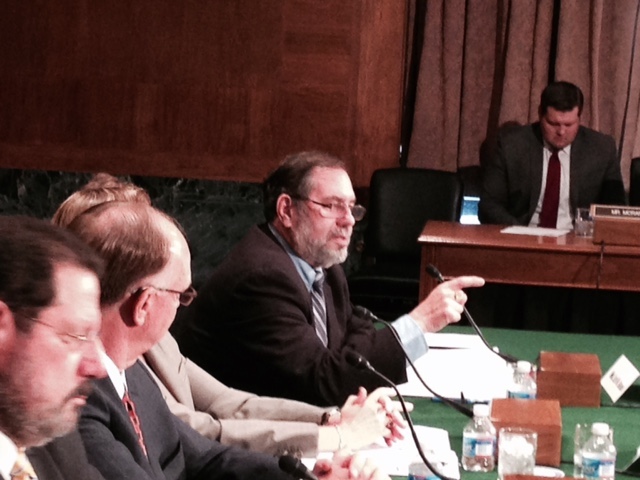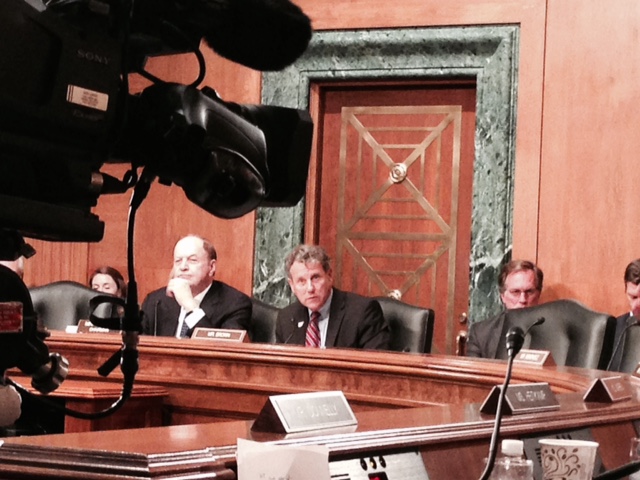USW President Gerard Tells U.S. Senate Committee: Lifting Crude Oil Export Ban Will Lead to Refinery Closures, Higher Consumer Prices, Lost Jobs, Less Economic Security
Contact: Lynne Hancock, 412-562-2442, 615-828-6169, lhancock@usw.org
Gary Hubbard, 202-256-8125, ghubbard@usw.org
WASHINGTON, D.C. (Jul. 28) – Leo W. Gerard, International President of the United Steelworkers (USW), testified today before the U.S. Senate Banking, Housing and Urban Affairs Committee in opposition to lifting the long-standing crude oil export ban.
“The increase in crude oil production in this country—joined with the current U.S. crude oil export ban—is boosting our economy,” said Gerard. “Consumers pay less for gas, and our refiners are able to compete globally with foreign refiners.”
He explained: “U.S. refiners are exporting value-added refined products now more than ever before,” adding that access to cheap American crude oil benefits other U.S. industries with family-supportive jobs like steel, the chemical sector, plastics and tires.
Most importantly, having a crude oil export ban makes us less dependent on an international cartel that influences prices for political reasons, Gerard said in citing the Organization of the Petroleum Exporting Countries (OPEC).
“If Congress lifts the crude oil export ban, gas prices will increase and some U.S. refineries could be forced to shut down, sending tens of thousands of jobs overseas,” the USW president declared.
 “There is more oil imported into the U.S. today than in 1975 when Congress enacted the crude oil export ban. Now demand is on the increase again.” He related further that U.S. Energy Secretary Ernest Moniz had told a recent House Energy & Power Subcommittee hearing that for every barrel of oil the U.S. would export, we would have to import a barrel to replace it.
“There is more oil imported into the U.S. today than in 1975 when Congress enacted the crude oil export ban. Now demand is on the increase again.” He related further that U.S. Energy Secretary Ernest Moniz had told a recent House Energy & Power Subcommittee hearing that for every barrel of oil the U.S. would export, we would have to import a barrel to replace it.
Gerard stated: “Let’s be clear, exporting a natural resource to have it refined overseas and imported back into the U.S. is a net job loser for America.”
Gerard told the senate committee the penalty for the American consumer as a result of lifting the export ban would add up to $25 billion per year, or $125 per driver and $257 per family.
The USW president posed these questions to the committee: “Do we lift the ban and give countries like China an added benefit, so they can continue to engage in trade practices that undermine U.S. jobs and manufacturing? Or do we maintain the ban and keep an American industry strong so our citizens have jobs and U.S. consumers are not gouged at the pump?”
The USW represents about 30,000 workers at 63 of the nation’s oil refineries, which accounts for two-thirds of domestic refining capacity.
- Gerard’s testimony before the Senate Banking Committee can be viewed at: Click Here.
- A support coalition, Consumers and Refiners United for Domestic Energy (CRUDE), released a study prior to the senate hearing on how fuel prices would be impacted if the crude oil ban was lifted: Click Here.
- In July 2014, the AFL-CIO Executive Council unanimously passed a policy statement opposing lifting the existing restrictions on crude oil exports, titled: ‘America Should Exploit the Advantages of Domestic Oil Production, Not Give Them Away.”
The USW represents 850,000 workers in North America employed in many industries that include metals, rubber, chemicals, paper, oil refining and the service and public sectors. For more information: http://www.usw.org/.
# # #
By clicking Sign Up you're confirming that you agree with our Terms and Conditions.
Recent Press Releases
Want to Learn More?
See how the USW is making a real difference in our communities and our workplaces.